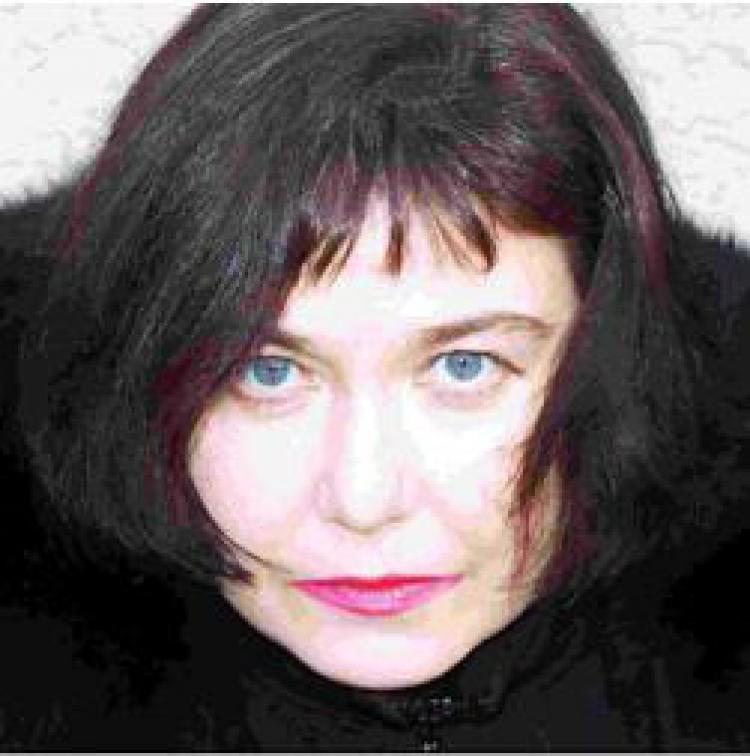SUMMER 07: Larissa Shmailo
Larissa Shmailo's work has appeared in Newsweek, About Poetry, Rattapallax, BigBridge.org, Lungfull!, American Translator's Slavfile, and many other publications. Her recent poetry CD, The No-Net World, received excellent reviews. Shmailo has been the recipient of "Critic's Picks" notices for her readings and radio appearances from the New York Times, Village Voice, Maud Newton, and Time Out magazine. She is active in the New York City poetry community as curator of the Sliding Scale Poetry series.
Music in the audio presentations was written by Bobby Perfect.
Listen to Shmailo read How My Family Survived the Camps
and Hunts Point Counterpoint , (¿Porque Somos Pobres?)
How My Family Survived the Camps
Was micht nicht umbringt, macht mich starker:
What does not kill me makes me stronger.
Nietzsche said this about other things
Not this.
How did my family survive the camps?
Were they smarter, stronger than the rest?
Were they lucky?
Did luck exist in Dora-Nordhausen,
Auschwitz and Bergen-Belsen?
How did my family survive?
They were young, my mother and father, in 1943
Twenty years old when taken as slaves.
No one knew my father was a soldier, a communist
So he was not shot
Or taken to be gassed.
My grandmother said quickly to the Germans
He is a mechanic; they needed mechanics
My grandmother, Soviet businesswoman
Begged and bribed the Ukrainian kapos
Begged and bribed the Germans, not SS
They took my father, son of a commissar
And shot the other men.
How did my family survive?
They offered no resistance
Did they collaborate?
Is complicity possible without choice?
They marched to Germany, working
Following the German army
Following the front
Digging trenches, carrying metal
These were the good camps, Kalinovka, Peremeshl
There was still food:
My mother recalls eating an entire vat of potatoes
Fouled by kerosene, discarded by the Germans, not SS
The treatment was not cruel, comparatively, not cruel:
In 1944, the Germans
Were as afraid of the Russian front
As the prisoners were of Germany
And of the other camps.
Where they went nonetheless
Where they were sent nonetheless.
How did they survive Erfurt, the selection?
My mother spoke good German
I see her now at the staging camp
Her keen wit dancing around the SS
Like her young Slavic feet
She was young and good-looking
Thin but good-looking
And the SS liked the Ukrainian Frauen.
On the cattle car to Dora
To the chimneys of that camp
My mother rode with her family intact
Thinner but intact
And ready for work.
How did my family survive?
Was it luck?
In Dora-Nordhausen
Where the air smelled of shit and gas
Where the sun rose but never shone
Was there luck?
The boxcar stopped
At the Nordhausen factory
The way out through the crematorium chimney in Dora
Here, my grandmother learned languages
Wstavach, Stoi, Ren, schwein, Halt.
In Dora, where not to understand an order meant death
My grandmother learned six languages; after six months
My family could work, hide and ask for bread
In all the languages of Europe.
They learned English the same way.
How did my family survive?
When the Americans came, with chocolate and blankets
My father, six foot one
Was one hundred and twenty pounds
And still we were rich, my mother interjects,
Rich compared to the Jews.
A few months longer, though, a few months longer
We would not have been alive.
How did my family survive?
My grandfather, a teacher
Told this story:
When the Americans came and saw the camp
They invited the people to loot the nearby towns
Take anything, the well-fed soldiers said
My grandfather stood and spoke: We are not animals, he said
But we were, my father interrupts, we were.
How did my family survive?
Survive is not the right word.
I'm alive, my father would say, alive
Alive because I did not die; others died.
Keep breathing, he encouraged me in difficult times
Keep breathing.
Hunts Point Counterpoint
(¿Porque Somos Pobres?)
¿Porque somos pobres? Why are we poor?
Ay, mi corazon, we have no skyscrapers here;
No metal tears the sky, we can see it, blue:
The gulls that fly above the el
Carry the Holy Ghost beneath their wings.
Mi preciosa, te quiero: God loves us, we are poor.
Porque somos pobres: Because we are poor
The police shame our women and beat up our men
Not in alleys, Abuelo, but in front of McDonald's.
The gulls that fly here are looking for garbage.
Porque somos pobres, because we are poor.
Ay, mi corazon, te quiero. We cannot depend
On the material world; we can only depend on God.
We don't chase a peso that can never be caught;
We don't steal time from God. The people downtown
Eat pesticides for supper. We have rice, God and rice, and we smile.
Abuelo, los pobres son brutos: Poor people are ugly.
Our mismatched old clothing, our worn-out old shoes.
The poor have no teeth, our bones are misshapen,
For want of a condom our kids die of AIDS.
The poor have TB and bronchitis and asthma;
The poor hate to breathe in the air of this world.
We kill one another and ourselves in the end.
Los pobres son brutos y mueren tan bruto:
Porque somos pobres: because we are poor.
¿Porque somos pobres? Why are we poor?
Querida, te quiero. No se porque,
Porque somos pobres. I don't know why we're poor,
Pero Dios te quiere y yo, yo tambien.
We have God and today, not then and tomorrow.
Because I am poor God loves me right now
As I love you. No se porque,
Porque somos pobres, but I love you and we have today.
© 2007 Larissa Shmailo
Latest news
-
23.04.24
-
18.04.24
-
04.04.24
-
26.03.24
-
21.03.24







